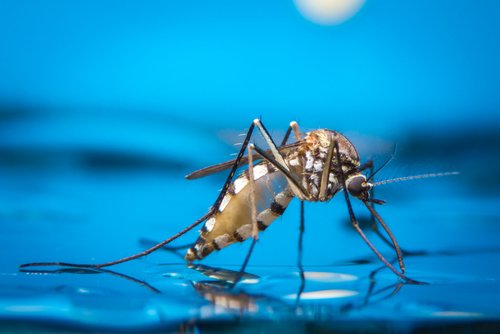- Share this article
- Subscribe to our newsletter
Genetically modified fungus to fight malaria
An international team of scientists have reported to have genetically modified a fungus so that it can kill mosquitoes as part of a new drive to fight malaria. The trial in Burkina Faso – which was conducted in a sealed model village – killed more than 99 per cent of 1,500 mosquitoes within 45 days and is being hailed as a “big step” forward by the study's authors, who come from the University of Maryland (UMD) in the USA and the West African nation’s Research Institute of Health Sciences (IRSS).
Malaria is a life-threatening disease spread by the female Anopheles mosquito. In 2017, there were an estimated 219 million cases world-wide, claiming 435,000 lives, according to the World Health Organization. The vast majority of cases are in Africa.
Brian Lovett, of the University of Maryland’s entomology department and lead author of the paper published in the journal Science, said the study had “broken through a barrier”.
Researchers took a strain of the fungus Metarhizium pingshaense, which infects mosquitoes in the wild, and genetically modified it to produce a toxin found in the venom of the Australian Blue Mountains funnel-web spider.
The GM fungus kills mosquitos more rapidly than they can breed
Laboratory trials showed the genetically modified fungus killed mosquitoes more rapidly than they could breed, according to the study.
The insecticide was then unleashed in a purpose-built 6,550-square-foot ‘village’ in Burkina Faso, containing huts, plants, and breeding pools, and covered in netting to stop the insects escaping.
“You can think of the fungus as a hypodermic needle we use to deliver a potent insect-specific toxin into the mosquito,” said Raymond St. Leger, professor of entomology at UMD and co-author of the study. “These fungi are very selective,” he added. “They know where they are from chemical signals and the shapes of features on an insect’s body. The strain we are working with likes mosquitoes.”
The study was the first trial outside of a laboratory using a transgenic approach to fighting malaria, according to the university.
Describing the research in Science, Lovett said: “No transgenic malaria control has come this far down the road toward actual field testing. This paper marks a big step and sets a precedent for this and other transgenic methods to move forward.”
“The next step will be to determine whether transgenic metarhizium is effective in an epidemiological trial, for example to test whether it has an impact on malaria,” he added.
The international team hope to test their transgenic fungus next in a real village or community and say the findings help make the case for such a trial to go ahead.
(Scidev.net/the telegraph/wi)
Reference:
Brian Lovett et al. (2019). Transgenic Metarhizium rapidly kills mosquitoes in a malaria-endemic region of Burkina Faso. In: Science 31 May 2019: Vol. 364, Issue 6443, pp. 894-897
DOI: 10.1126/science.aaw8737





Add a comment
Be the First to Comment